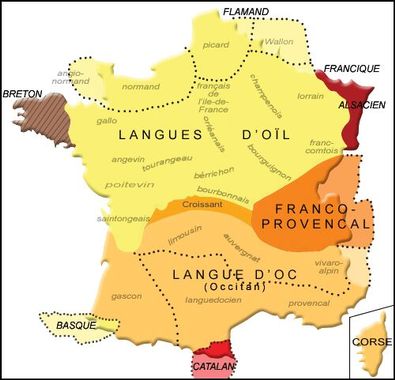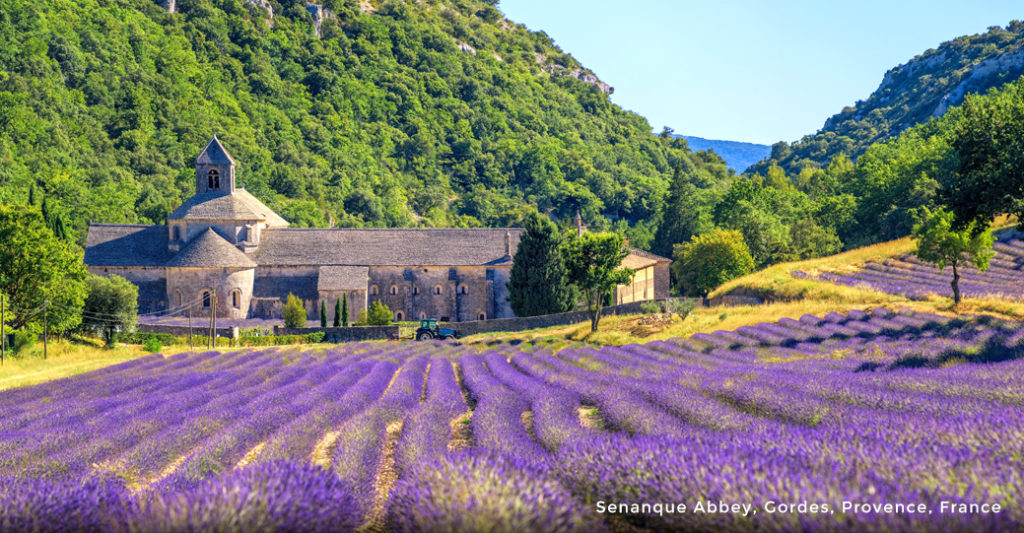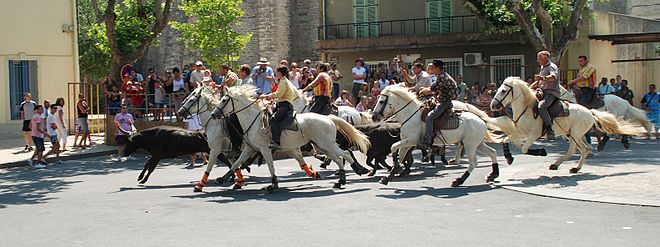Southern French Slang
To any foreigner having to drop by Southern France, you may have been staggered by French slang.
That makes sense. We definitely speak French but also have our own jargon. This may be due to a long trail of history and linguistic blend. However, strictly speaking, before France became the nation it is today, it was made up of several kingdoms in the Middle Ages, among which three main linguistic families emerged:
- Occitan or Langue d’Oc
- Langues d’Oïl
- Franco-provençal

As you might see in the map, other languages were spoken as well such as Corsican, Breton, Catalan, Basque, Alsacien and so on. As a result, the linguistic variety of vernacular expressions in France is quite rich.
Personally, I think any regional language matters. I have no time to deal with all of them here, but might do so in the future. So, if you’re Breton, Basque or from any other French place, please keep in mind I didn’t forget or dismiss you by mentioning only those 3 main languages and may post about your language soon enough.

We won’t focus on langue d’Oïl or Franco-provençal today but that may be the topics of another post, should we be learning bits of Chtimi – which is quite enjoyable but I need to do some research on that because I am no specialist. ^^
As a southerner, I am proud of coming from such a nice place and that is the reason why I would like people to know more about our culture and slang. As I mentioned in my previous posts, slang is an integral part of a culture.
I am thus going to put the emphasis on some typical Southern slang or expressions.

Slang from Southern France
The following expressions are mainly from Southern France. Some may not be considered as slang but remain rather typical:
- Pitchoun: kids, another way of describing those little creatures who run around all day. (Pronounce the final “n”)
- Peuchère: you poor thing. Often used ironically.
- Brave: a sucker… Being nice is all right but being too nice means you’re weak and that is being “brave”.
- Gavé de monde, clafi de monde : full of people, crowded, packed.
- Degun: nobody. This one is a must-know if you ever go to Marseilles or Provence. (Pronunce it “Dég 1”)
- Fada, avoir le vire-vire dans la tête, un fondu, un jobastre, un calu: crazy, nuts, a nutter. (“Il roule comme un calu cet abruti !”)
- T’inquiète! (je gère): t’inquiète pas => don’t worry (I can handle my shit). A short way of writing this while texting is “tkt”.
- Le cagnard: the sun, especially when it’s scorching hot.
- Une cagole: a bimbo, an airhead. Yeah, we got some too. (pronounce “gu” not like “j” before the “o”)
- Vé!: Expression quite similar to “Watch this! Lo (and behold)!”
- Tè!: Almost the same as Vé! but Vé is more focused on “look!”. Tè is closer to “Tiens!” (Here, here you go).
- Oh con !, Fatch de! , Ôh Fan!, Fan dé/(Hil)dé pute ! (watch out when you say the last one because some other French people might understand it the wrong way if they’re not familiar with Southern French) and lastly, the famous “Fan de Chichourle/Chichoune!”. The latter is really funny and nice to use. Indeed, people may smile whenever you use it. They all mean D*** ! , F*** ! to express your amazement or discontent.
- Pastaga: Pastis. A typical beverage that’s quite famous near Marseilles.
- Feria: it’s a cultural thing. It doesn’t always have to include bulls in it. It’s a good old way to go out, drink happily (too much?) and meet friends. We can have “abrivados” (running with the bulls being surrounded by horses and gardians) or “encierros” (closing a village and teasing the bulls. This one is more violent). Feel free to check those terms on the internet.
- Une piche: a good for nothing, a loser, a moron.
- Un pébron: an idiot (in Provençal, this also means pepper)
- Ça m’espante: it amazes me. Espanté means you were quite surprised, not to say gobsmacked. Often used as a hyperbole though… “Comme i(l) gère au ballon (football), ça m’a espanté.”
- Emboucaner: to stink, reek.
- Ensuqué: tired, sleepy. Usually because it’s very hot. Can be used to describe a halfwit. (“Vé le lui ! Il a l’air tout ensuqué.”)
- Chaler: in Provence, this means letting a friend sit on the handlebars while you pedal (very convenient when you’re a kid and you wanna go far with your friends but lack any susbtantial means of transport… ^^). I happened to notice that not many French people got my drift when I said that… So at least, you’ll be familiar with this term. (“Viens, on va à la galerie marchande cette aprèm, tu me chales?”)
- Clampin, dormiasse, mouligasse, feignasse: lazybones.
- Ça/tu m’escagasse(s) !: this is/you’re a pain in the a*** !. Typically from Provence when someone/something annoys you. Can also say “tu/ça me fait caguer”.
- Empéguer: empégué can mean “drunk”, “hit” (by) something or “fined” by a cop. (“Quel pébron! I(l) s’est empégué le mur après avoir quillé le ballon.”)
- Adéssias: bye in provençal
- Quésaco ?, Qu’es aquo ?: C’est quoi ? => What is that ?
- (S’)Escamper: leave. (“Bon, il se fait tard. Aller zou, je m’escampe”)
- Empapaouter: to con, to dupe.
- Ça pègue: it’s sticky. Usually to describe the floor when beers has been spilled on it, quite mucky and sticky indeed.
- Cané: knackered, worn out, exhausted.
- Une bugne: French equivalent of “coup”, hence a blow. (“Vé ! La bagnole, elle a pris une bugne ici…”)
- Oh garri ! (to a man), Oh nine ! (to a woman): Hey young man / lady !
- (Es)Quiché : packed in a bus or metro or anywhere else. (“C’est petit ici, vé comme on est quiché!”)
- Décaniller: its French equivalent would be “dégommer”. So, it might mean “take out”, “pick off”, “unstick”, “unseat”… (“Au jeu de société Risk, je t’ai décanillé tous tes pions”)
- Rouméguer: to grumble, moan. In the north, they use “râler”.
- Avise!, Meff(i)!: from my perspective, “avise”(from aviser) is typically from Nîmes and I use it a lot. It can be heard in Ferias when the bull is running towards you and a friend warns (French equivalent of aviser) you for you to move. “Meff” or “meffi” is used around Marseilles to say “be careful” – it is short for “méfie-toi”.
Additional vocabulary
Finally, a few expressions which are more from the region of Toulouse, Bearn and the Basque country (not necessarily slang though):
- Chocolatine. I couldn’t avoid that one. In other places, they say “Pain au chocolat”. We say chocolatine. Full stop.
- Adiou, Adishatz : Hello or Goodbye. Depends on when you say it (both words can be used anytime). Usually, from my perspective, “Adiou” is more used to say hi and adishatz bye, but it depends on how you use them.
- Arsouille: an alcoholic. Used to take the piss out of a mate.
Finally, this last expression is probably not from the south but I like it so I hope more people become aware of it: “Ouais et ma grand-mère, elle a un grille pain.” If you’re not familiar with this expression you may wonder why I say that because it makes no sense whatsoever. The truth is by saying that I imply that what you say is absolutely ininteresting and dull, so much so that I can’t be bothered listening to it anymore. It’s a nice subtle way of saying “Yeah yeah whetever.”
Please note that a lot of people use all those expressions, they be from South-East or South-West France, whereas some don’t. It all depends.
But one thing is for sure, you may hear a lot of similarities between Southerners. For instance, if you’re located in the South, you might be likely to hear the “s” at the end of “moins” pronounced a lot more than, say, in Paris. Likewise, “une brêle” (a good for nothing, a loser) will probably have negative connotations anywhere in the South (and elsewhere) as well…
Feel free to let me know if you think other great expressions should be added to that list. I will do my best to update it frequently, if any new expression springs to mind.
Truth is, there are so many, I can’t write all of them. What I wrote is just an appreciation from my personal experience. I wrote the ones I use most? In addition, some terms may have a lot more meanings than those I explained.
So, feel free to share your insights!
Adishatz l’ami!
Posted on February 5, 2021 by Mat.


